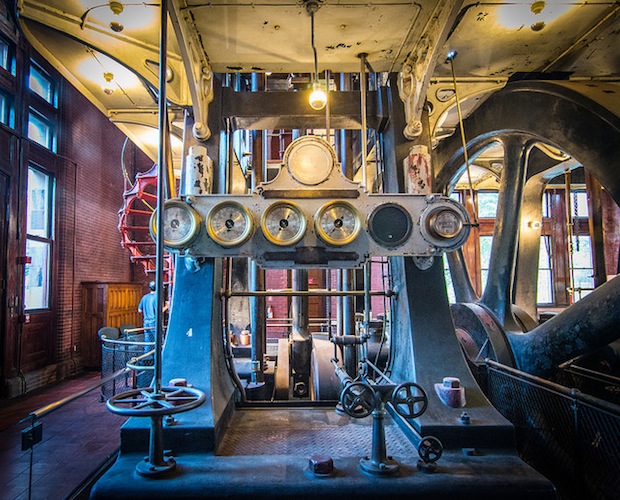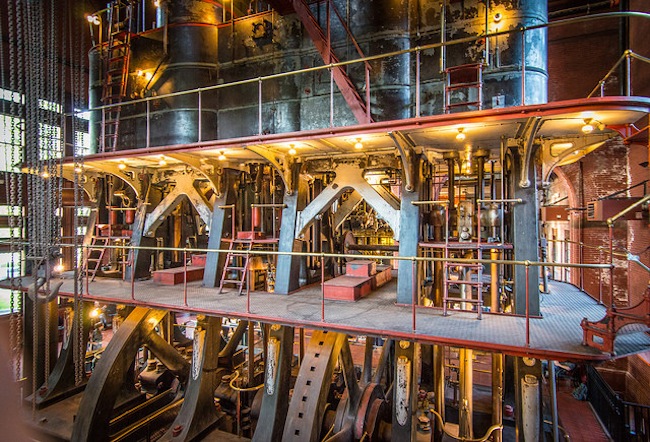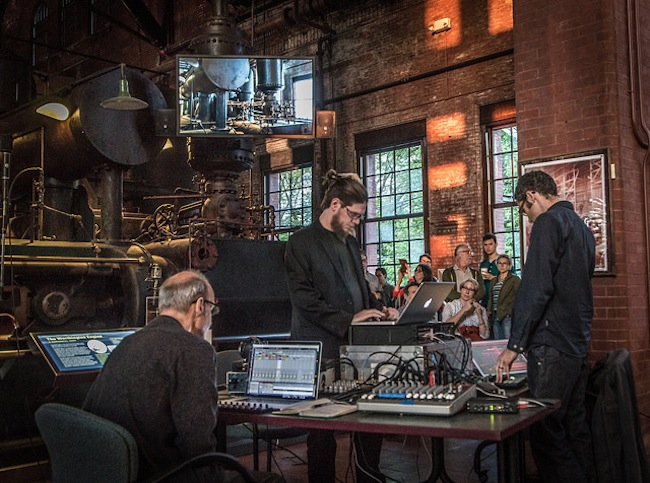Fuse Concert Review: New England Phonographers Union Pump It Up
New England Phonographers Union at Waterworks Museum suggested a buttoned-down, all-ages, hipster-techie incarnation of a hip-hop rave led by a trio of laptop DJs.
by Milo Miles
The most engaging aspect of a sound-installation music performance is that everyone is a participant. Not only the performers and the audience, but the surrounding space itself. After all, the space is not a pro — was never designed to clearly convey sound to ears. But on May 14, when the New England Phonographers Union (Matt Azevedo, Ernst Karel, and Jed Speare) set up a performance at the Metropolitan Waterworks Museum it was hard for the setting not to steal the show.
The much-modified recordings by Azevedo, Karel and Speare were very harmonious for the space, consisting of “structural vibration and airborne sound” produced at the Deer Island Waste Water Treatment Plant and for this performance incorporating recordings made with “accelerometers of seismic phenomena” that are inaudible to humans. The audience was encouraged to move about for sonic perspective. The Waterworks offered a glory of diverse reflective surface — wood ceilings, brick walls, steel machinery, glass windows, concrete floors, with guest ambience from the occasion D line subway train rumbling past and the languid springtime sunset handling the lighting effects.
As you wandered among the colossal pump-wheels, vast water tanks and more bolts than a century’s worth of thunderstorms, it was impossible not to imagine this as a more hypnotic, shapely and indeed mellifluous rendition of what the plant sounded like when its long-silenced machines were in operation. At last — industrial music made by real industrial machines played in a real industrial setting.
The one unfortunate restriction is that exploring the Waterworks Museum is limited to a single floor level in the machinery section itself. I was particularly curious what the undulating sound of water flows, off-kilter repetition clanks, and floating gear hiss would sound like in the dusky bowels of the Waterworks, which you could only view illuminated by spotlights at the bottom of the chained-off stairs that led below.
The show, hosted by Non-Event, drew quite a good-sized and diverse crowd for the hourlong performance, which seemed to be divided into two roughly equal segments. Electronics is the grand equalizer of modern styles. New England Phonographers Union at Waterworks Museum suggested a buttoned-down, all-ages, hipster-techie incarnation of a hip-hop rave led by a trio of laptop DJs, looking at computer screens and twiddling knobs with sublime timing. Let me hear you say Clank! Give it up for Whirrr!
Milo Miles has reviewed world-music and American-roots music for “Fresh Air with Terry Gross” since 1989. He is a former music editor of The Boston Phoenix. Milo is a contributing writer for Rolling Stone magazine, and he also written about music for The Village Voice and The New York Times. His blog about pop culture and more is Miles To Go.





I am fairly certain that it was not “much modified recordings” but instead, completely unprocessed field recordings.
Steve is in fact correct. No processing was used except for panning between the six speakers. Thank you for coming out!